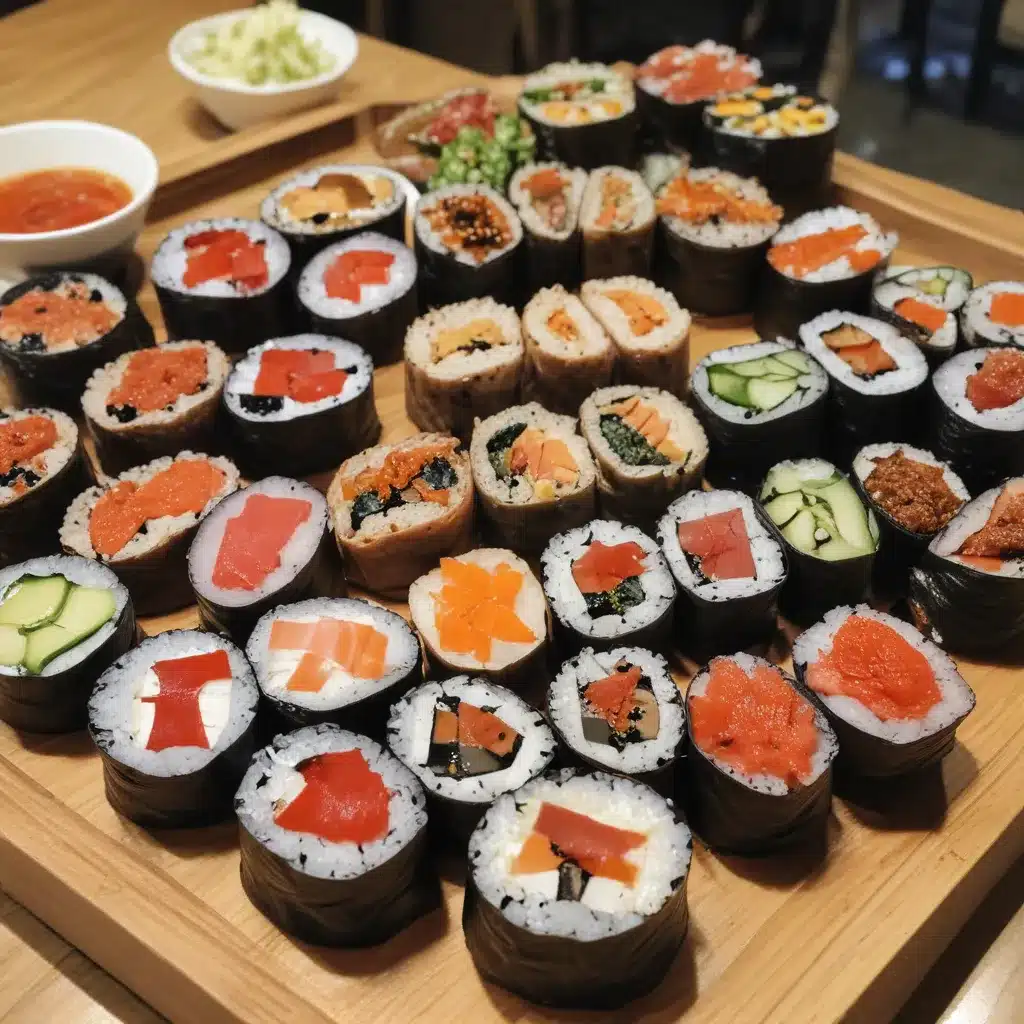
Discovering the Vibrant Flavors of Korean Cuisine in Boston
As a self-proclaimed foodie and avid explorer of Boston’s diverse culinary scene, I’ve always been intrigued by the rich and captivating world of Korean cuisine. Growing up, my exposure to Korean food was limited to the occasional kimbap (Korean seaweed rice rolls) or bulgogi (marinated grilled beef) dish, but it wasn’t until I stumbled upon Korean Garden Boston that my palate was truly awakened to the incredible depth and complexity of this dynamic culinary tradition.
In a city renowned for its mouthwatering Italian fare and iconic New England seafood, it’s easy to overlook the hidden gems of Korean gastronomy. But let me tell you, dear reader, once you step through the doors of Korean Garden Boston, your taste buds will be in for a delightful and unforgettable journey.
Unraveling the Mysteries of Korean Cuisine
As I settled into the cozy, authentic atmosphere of Korean Garden Boston, I couldn’t help but wonder, “What culinary secrets lie in wait for me to discover?” The menu, brimming with an array of tantalizing dishes, presented a world of possibilities – from the classic kimchi (fermented spicy cabbage) to the more adventurous offerings like japchae (sweet potato noodles with vegetables) and galbi (marinated short ribs).
I knew that to truly appreciate the nuances of Korean cuisine, I would need to dive deeper, to peel back the layers of tradition and technique that have been carefully honed over generations. And that’s exactly what I set out to do, armed with an insatiable appetite and a thirst for culinary knowledge.
Exploring the Flavors and Traditions of Korean Garden Boston
My first foray into the world of Korean cuisine at Korean Garden Boston began with the classic kimbap. As I unraveled the tightly wrapped roll, I was met with a symphony of flavors – the earthy nori, the subtly sweet rice, the savory pickled vegetables, and the unexpected crunch of sesame seeds. Each bite was a revelation, a testament to the meticulous attention to detail that goes into the preparation of even the most seemingly simple dishes.
But kimbap was just the tip of the iceberg. As I delved deeper into the menu, I discovered a veritable treasure trove of Korean culinary wonders. The japchae, with its silky noodles and vibrant medley of vegetables, was a revelation, a dish that perfectly encapsulated the balance of sweet, salty, and umami that characterizes so much of Korean cuisine.
And then there was the galbi, the succulent short ribs that had been marinated in a complex blend of soy sauce, brown sugar, and spices, then grilled to perfection. The first bite was a revelation, the tender meat melting effortlessly on my tongue, accompanied by the rich, caramelized edges that added depth and complexity to every morsel.
As I savored each dish, I couldn’t help but be struck by the depth of flavor and the intricate interplay of textures. It was as if the chefs at Korean Garden Boston had somehow managed to distill the very essence of Korean culinary tradition into every bite.
Discovering the Art of Korean Banchan
But the true magic of Korean cuisine, in my opinion, lies not just in the main dishes, but in the array of small plates known as banchan. These side dishes, which often accompany a Korean meal, are a testament to the culinary artistry and attention to detail that permeates the Korean culinary landscape.
At Korean Garden Boston, the banchan spread was a revelation. Crisp, tangy, and perfectly seasoned, the kimchi was a standout, with its perfect balance of spice, acidity, and umami. The japchae, with its delicate noodles and vibrant vegetables, was a revelation, a dish that perfectly encapsulated the balance of sweet, salty, and umami that characterizes so much of Korean cuisine.
And then there were the lesser-known gems, like the gosari (fernbrake), a delicate, earthy vegetable that had been meticulously prepared, and the kongbap, a hearty dish of sautéed beans and rice that was both comforting and deeply satisfying.
As I explored the banchan, I couldn’t help but be struck by the sheer diversity and complexity of flavors on display. Each dish was a masterclass in seasoning and technique, a testament to the deep culinary traditions that have been passed down through generations of Korean cooks.
The Vibrant Culinary Community at Korean Garden Boston
But the true beauty of Korean Garden Boston lies not just in the food, but in the vibrant community that surrounds it. As I sat at one of the cozy tables, I couldn’t help but be struck by the warmth and energy of the space, the way it seemed to bring people together around the shared love of good food and good company.
I struck up a conversation with a couple seated next to me, and they regaled me with tales of their own culinary adventures in Korea, sharing their favorite dishes and the stories behind them. It was a humbling and enlightening experience, a reminder that Korean cuisine is not just a collection of recipes, but a living, breathing tradition that is deeply rooted in the lives and experiences of the people who keep it alive.
And as I listened to their stories, I couldn’t help but be reminded of the importance of preserving and celebrating the rich diversity of global cuisines. In a world that can sometimes feel homogenized and standardized, places like Korean Garden Boston stand as beacons of cultural heritage, reminding us that there is beauty and richness in the unique flavors and traditions that make each cuisine so special.
Elevating the Korean Culinary Experience
But Korean Garden Boston isn’t just a place to enjoy delicious food – it’s also a hub for culinary education and exploration. The restaurant regularly hosts cooking classes and demonstrations, where guests can learn the techniques and traditions behind their favorite Korean dishes.
I had the opportunity to attend one of these classes, and I can attest to the passion and expertise of the instructors. They guided us through the step-by-step process of making traditional Korean staples like kimchi and japchae, sharing insider tips and tricks that brought these dishes to life in a way that simply reading a recipe could never capture.
And as I rolled up my sleeves and got to work, I couldn’t help but be struck by the sense of community and camaraderie that permeated the room. It was as if we were all part of a secret society of Korean cuisine enthusiasts, united by our shared love of these vibrant, complex flavors.
Embracing the Full Spectrum of Korean Cuisine
But the true beauty of Korean Garden Boston lies in its ability to showcase the full breadth and depth of Korean culinary tradition. While the restaurant’s menu is anchored in the classic dishes that have stood the test of time, the chefs are also unafraid to experiment and push the boundaries of what Korean cuisine can be.
I had the opportunity to sample some of the restaurant’s more innovative offerings, like the kimchi fried rice, a bold and flavorful take on a Korean staple, and the Korean-style chicken wings, which combined the savory, spicy flavors of traditional Korean cuisine with the familiar comfort of a beloved bar food.
And as I savored these unique creations, I couldn’t help but be reminded of the dynamic and ever-evolving nature of Korean cuisine. Just as the culture and traditions of Korea have evolved over time, so too has its culinary landscape, with chefs and home cooks alike constantly pushing the boundaries of what’s possible.
Embracing the Spirit of Korean Culinary Tradition
But perhaps the most profound aspect of my experience at Korean Garden Boston was the way it allowed me to connect with the rich cultural traditions that underpin Korean cuisine. As I delved deeper into the flavors and techniques on display, I couldn’t help but be struck by the sense of reverence and respect that permeated every aspect of the experience.
It was as if the chefs and staff at Korean Garden Boston were not just serving up delicious food, but were also acting as stewards of a culinary heritage that stretches back generations. And in doing so, they were inviting me to become a part of that tradition, to immerse myself in the flavors and stories that make Korean cuisine so special.
And as I left Korean Garden Boston, my senses still tingling with the vibrant flavors and aromas I had experienced, I couldn’t help but feel a renewed sense of appreciation for the rich diversity of global cuisines. In a world that can sometimes feel homogenized and standardized, places like Korean Garden Boston stand as beacons of cultural heritage, reminding us that there is beauty and richness in the unique flavors and traditions that make each cuisine so special.
So if you find yourself in the heart of Boston, seeking a culinary adventure that will transport you to the vibrant heart of Korean culture, I urge you to make your way to Korean Garden Boston. Prepare to have your palate awakened, your senses delighted, and your appreciation for the art of Korean cuisine forever transformed.
